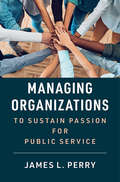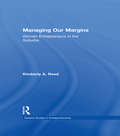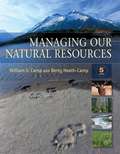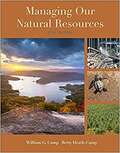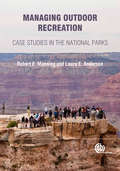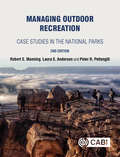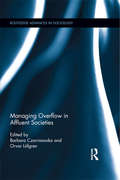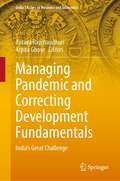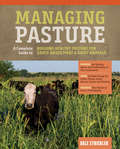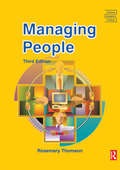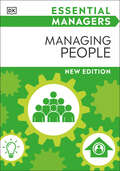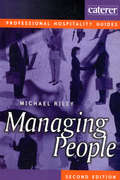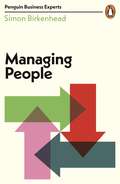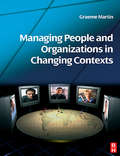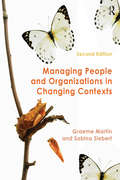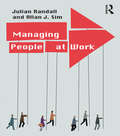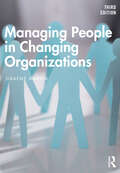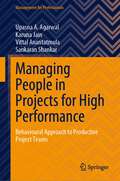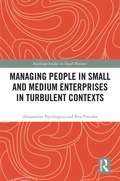- Table View
- List View
Managing Organizations in the United Arab Emirates
by Martin Spraggon Virginia BodolicaMany management practitioners, consultants, and students have heard about the Dubai miracle, but little is known about the specific challenges and opportunities of doing business and managing UAE-based organizations. Managing Organizations in the United Arab Emirates seeks to familiarize readers with the nature of doing business and managing organizations in the Middle East by bringing together case studies highlighting the dynamic characteristics and drivers of economic development in one of the most dynamic and rapidly growing economies in the world. Spraggon and Bodolica's dynamic collection includes six case studies of local organizations, accompanied by discussion questions and research-driven analyses, to uncover and assess the opportunities and challenges of managing UAE-based small firms, family businesses, and entrepreneurial ventures. Highlighting the dynamic characteristics and drivers of economic development in one of the most rapidly growing economies in the world, the volume's case studies help to define the features of UAE-based organizations, which set them apart from other companies in the Middle East.
Managing Organizations to Sustain Passion for Public Service
by James L. PerryAlmost three decades ago, James Perry created the first survey instrument to measure public service motivation. Since then, social and behavioural scientists have intensively studied the motivating power of public service. This research relating to public service motivation, altruism and prosocial motivation and behaviour has overturned widespread assumptions grounded in market-orientated perspectives and produced a critical mass of new knowledge for transforming the motivation of public employees, civil service policies and management practices. This is the first study to look systematically across the different streams of research. Furthermore, it is the first study to synthesize the research across the applied questions that public organizations and their leaders confront, including: how to recruit ethical and committed staff; how to design meaningful public work; how to create work environments that support prosocial behaviour; how to compensate employees to sustain their public service; how to socialise employees for public service missions; and how to lead employees to engage in causes greater than themselves.
Managing Orthopaedics at Rittenhouse Medical Center
by James Weber Robert S. Huckman Richard Bohmer Kevin J. BozicConsiders the issues associated with running multiple business models--a private practice and an academic faculty practice--within the confines of the orthopaedics department of a single medical center. Students assume the role of Neela Wilson, Executive Director of Rittenhouse Medical Center, in managing the operational requirements of, and organizational tensions created by, these competing models. In analyzing the case, students have the opportunity to: (1) gain a better understanding of operational focus and the concept of a "focused factory" in health care, (2) consider the concept of a "factory within a factory" in the context of an academic medical center, and (3) build an appreciation of the managerial challenges associated with operating related, and often competing, business units within the same organization.
Managing Our Hub Economy: Strategy, ethics, and network competition in the age of digital superpowers
by Marco Iansiti Karim R. LakhaniFeature
Managing Our Margins: Women Entrepreneurs in the Suburbs (Garland Studies in Entrepreneurship)
by Kimberly A. ReedMany women seek to achieve greater control over their working lives by making a transition to entrepreneurship and, as a result, must negotiate gender norms and gender-related expectations in both business and personal relationships. Based on interviews with women in the New Jersey suburbs, this book explores the range of uncertainties and practical dilemmas independent businesswomen face today.
Managing Our Natural Resources
by Betty Heath-Camp William G. Camp Al D. StokesExplore the world's natural resources and the ways professionals manage them with MANAGING OUR NATURAL RESOURCES, 6th Edition! An introduction to agricultural issues and careers, this book examines a broad variety of topics from forest fires and fishery management to water purification and energy conservation. Organized into an eight-unit overview, chapters cover the must-know fundamentals of land, water, and air, forestry, fish and wildlife, and energy and mineral resources, along with the problems impacting them today. Full-color photographs, illustrations, and case studies add depth and clarity to every chapter, while appendices urge you beyond the book to websites, certification programs, and additional learning opportunities that help you develop critical thinking skills. Now available in an eBook with highlighting and search capabilities, MANAGING OUR NATURAL RESOURCES, 6th Edition invites you to dig in and uncover today's opportunities in the agricultural sciences.
Managing Our Natural Resources
by Betty Heath-Camp William G. CampNew edition of a text that presents a balanced viewpoint of the place of humans in the world as long-term residents. Camp (Virginia Polytechnic Institute and State U.) and Daugherty (Maconaquah High School) present 35 chapters that deal with soil formation, erosion, reclamation, and conservation; water use and improvement; endangered species of wildlife; hunting game animals; fishing; safety in boating, hiking, and other forms of outdoor recreation; conservation farming; land-use planning; construction practices that minimize the impact of exploitation on the environment; energy resources use, abuse, conservation, and alternatives; mineral use and recycling; and career opportunities in each of those diverse fields. Contains b&w illustrations. Annotation c. Book News, Inc., Portland, OR (booknews.com)
Managing Our Natural Resources
by Betty Heath-Camp William G. CampExplore the worlds natural resources and the ways professionals manage them with MANAGING OUR NATURAL RESOURCES, 6th Edition! An introduction to agricultural issues and careers, this book examines a broad variety of topics from forest fires and fishery management to water purification and energy conservation. Organized into an eight-unit overview, chapters cover the must-know fundamentals of land, water, and air, forestry, fish and wildlife, and energy and mineral resources, along with the problems impacting them today. Full-color photographs, illustrations, and case studies add depth and clarity to every chapter, while appendices urge you beyond the book to websites, certification programs, and additional learning opportunities that help you develop critical thinking skills. Now available in an eBook with highlighting and search capabilities, MANAGING OUR NATURAL RESOURCES, 6th Edition invites you to dig in and uncover todays opportunities in the agricultural sciences.
Managing Our Natural Resources
by Betty Heath-Camp William G. CampExplore the world's natural resources and the ways professionals manage them with MANAGING OUR NATURAL RESOURCES, 6th Edition! An introduction to agricultural issues and careers, this book examines a broad variety of topics from forest fires and fishery management to water purification and energy conservation. Organized into an eight-unit overview, chapters cover the must-know fundamentals of land, water, and air, forestry, fish and wildlife, and energy and mineral resources, along with the problems impacting them today. Full-color photographs, illustrations, and case studies add depth and clarity to every chapter, while appendices urge you beyond the book to websites, certification programs, and additional learning opportunities that help you develop critical thinking skills. Now available in an eBook with highlighting and search capabilities, MANAGING OUR NATURAL RESOURCES, 6th Edition invites you to dig in and uncover today's opportunities in the agricultural sciences.
Managing Outdoor Recreation
by Laura E Anderson Robert E ManningThe popularity of outdoor recreation and ecotourism continues to grow worldwide. However, there is little systematic information on how to manage outdoor recreation in ways that protect park resources and the quality of the visitor experience. This book develops classification systems of outdoor recreation-related problems and management strategies and practices and combines them into a series of matrices that can help guide park and outdoor recreation management. The book then uses a series of case studies drawn from the U.S. National Park System that illustrate a range of successful management approaches that can be applied globally. The book concludes with a series of principles for managing parks and outdoor recreation.
Managing Outdoor Recreation: Case Studies in the National Parks
by Robert Manning Laura E Anderson Peter PettengillThis fully updated second edition presents a conceptual framework of outdoor recreation management in the form of a series of management matrices. It then illustrates this framework through new and updated case studies in the US national parks, and concludes with the principles of outdoor recreation management. Written by an author team with extensive academic and practical experience in the field of outdoor recreation, the book: - Develops and presents a matrix-based framework of strategies and practices for managing outdoor recreation in a sustainable way. - Illustrates application of best management practices through a series of case studies in diverse national parks. - Includes lecture slides and online matrices to aid the teaching of outdoor recreation management to a new generation. Managing Outdoor Recreation, 2nd Edition is an essential resource for undergraduate and graduate students of parks, outdoor recreation and related subjects, as well as a helpful tool for practitioners.
Managing Overflow in Affluent Societies (Routledge Advances in Sociology)
by Orvar Löfgren Barbara Czarniawska“It is simply too much” is a common complaint of the modern age. This book looks at how people and institutions deal with overflow - of information, consumption or choices. The essays explore the ways in which notions of overflow – framed in terms of excess and abundance or their implicit opposites, scarcity and dearth – crop up in a number of contexts such as sociological and economic theory, management consulting, consumer studies, and the politics of everyday life. Chapters range from studies of overload at home, at work or in the world of cyber information; strategies of coping with overflow in institutions such as news agencies; and historical comparisons. When, where, how and for whom is overflow a problem or a blessing?
Managing Pandemic and Correcting Development Fundamentals: India’s Great Challenge (India Studies in Business and Economics)
by Arpita Ghose Ajitava RaychaudhuriThis book discusses the extent and nature of COVID-19 pandemic in India and its effect on the society and economy. The suggested management practices discussed here are also not stereotype. At the same time, it highlights deficiency in development fundamentals in India on several dimensions, especially health, education, quality of public spending, taxation orientation, external trade involvement across states, etc., deficiencies which create an inbuilt bottleneck toward the creation of a more equal society. While discussing these, the book throws light on how they were expectedly exacerbated by the sudden negative shock in the form of COVID-19 pandemic. Thus, the book has highlighted the COVID pandemic and its response in India in the background of certain less discussed aspects of development fundamentals. The contents would be of interest to researchers and students studying socioeconomic aspect of developmental economics and also to policy makers and non-government entities involved in mitigating effects of pandemic in the socioeconomic sphere.
Managing Pasture: A Complete Guide to Building Healthy Pasture for Grass-Based Meat & Dairy Animals
by Dale StricklerThe health and profitability of grass-based livestock begins with the food they eat. In Managing Pasture, author Dale Strickler guides farmers and ranchers through the practical and ideological considerations behind caring for the land as a key part of running a successful grass-based operation, from the profitability of replacing expensive grain feed with nutrient-rich native grasses to the benefits of ecologically-minded land management. In-depth examinations of the biology and benefits of grazing plants and different grazing strategies accompany detailed plans for paddock and fencing set-ups, livestock watering, and effective methods for dealing with common pasture problems throughout the seasons, from mud to drought. For readers invested in pasture improvement strategies that offer environmental benefits beyond better meat and dairy, including carbon sequestration, erosion prevention, increased pollinator resources and wildlife habitat, and improved water quality, Managing Pasture is an approachable, accessible guide to creating and caring for the grassland that feeds animals and future generations. This publication conforms to the EPUB Accessibility specification at WCAG 2.0 Level AA.
Managing People
by Andrew Thomson Rosemary Thomson'Managing People' addresses the perspective of the individual manager whose role includes the management of people, as well as issues concerning the organization as a whole. The theme of the book is about responding to organizational and environmental change and the people skills that will be required for this in the twenty-first century. A system model of how the different parts of HR fit together is included, with the acknowledgement that different contexts require different approaches, and the role of the individual manager is considered within them. The stakeholder perspective is examined as it affects the management of people, and links human resource management policy and practice to financial results. This new edition also reflects the modern move towards performance management as an organizational business strategy. The role of leadership at all levels of the organization is also emphasized.There is a new chapter on managing challenging situations, such as the management of diversity, power, stress, and conflict, as well as the handling of grievances and discipline. Another new chapter pulls together the increasingly important aspects of the legal regulation of behaviour at work, and stresses the move from collective relationships to individual rights in the workplace. This text is suitable for use on the Chartered Management Institute Diploma level modules on recruitment and selection, managing performance, and developing teams and individuals. It is also to be used for NVQ courses in HRM at levels 4 and 5 and is valuable for HR Professionals and line managers.
Managing People (DK Essential Managers)
by DKThe practical guide that gives you the tools to succeed when managing people. This title in DK's Essential Managers series contains all you need to manage people effectively and to develop or hone your management style.Find out how to improve your skills by learning how to motivate staff, improve performance, and create positive relationships. You'll learn to build confidence, communicate clearly, and establish trust for navigating situations such as giving feedback, settling conflicts, and managing teams remotely. In a slim, portable format, Essential Managers gives you a practical "how-to" approach with step-by-step instructions, tips, checklists, and "ask yourself" features showing you how to focus your energy, manage change, and make an impact.Whether you're new to people management or looking to enhance your existing skills, this is the guide for you.
Managing People (Hospitality Essentials Ser.)
by Michael Riley Andrew ThompsonThis new second edition of 'Managing People' provides a practical approach to applying up-to-the-minute management techniques, and is a vital source of information for professionals in the hotel and catering industry responsible for personnel and training. Riley explores how aspects such as labour cost, utilization, labour market behaviour and pay are inseparable from the skills of people management. In the new edition he extends his ideas on productivity so as to encompass its relationship with functional flexibility. In a similar manner, thinking about motivating people is extended to include modern ideas about commitment. We all loosely refer to peoples' attitude but here he shows the complexity that lies behind them. It is especially of relevance for managers with responsibility for personnel and training, and degree-level students will also find its non-prescriptive, user-friendly approach helpful.Michael Riley has extensive experience in the hotel and tourism industry and communicates in a way that reflects that experience.
Managing People (Penguin Business Experts Series)
by Simon BirkenheadBecoming a manager is not a progression in your career, it's a move into an entirely new job, one that requires a unique set of skills. Get it right and you'll inspire your team to deliver outstanding results. But get it wrong and you'll create stress, apathy and dysfunction in your team.Penguin Business Expert Simon Birkenhead has been guiding first-time and established managers for over two decades, helping them implement his blueprint for success. Here he reveals his framework that clearly explains what you must do for your employees to be the best they possibly can. Learn how to:- Activate motivation - Set clear expectations - Provide effective feedback - Master your communication skills- Build a high-performance team cultureManaging People is your complete guide to becoming a truly great manager for whom people want to do their best work.
Managing People and Organizations in Changing Contexts
by Graeme MartinManaging People and Organizations in Changing Contexts addresses the contemporary problems faced by managers in dealing with people, organizations and managing change in a theoretically-informed and practical way. This textbook is a contemporary and relevant alternative to the standard works that cover material on Organization Behaviour and Human Resource Management because it approaches people management from the perspective of managers and aspiring managers. The book has an international orientation and many of the cases and examples in the book reflect this. It addresses the problems that managers face in managing people in old and new economy organisations and is interdisciplinary in its approach, including contributions from management, organisational behaviour, HRM, strategy, marketing and reputation management, and technology. This text meets the requirements of managers, leaders and students in managing people in contemporary and changing contexts. Managing People and Organizations in Changing Contexts offers: * a contemporary and relevant edge with an original structure * awareness of international and current trends and up-to-the-minute detail. * cases based on original research and consulting experience * new material on the role of management and leadership, technology and reputation management, and covers much of the material for CIPD’s core management standards * material that has been tested with managers and students in Europe, the USA and Asia * a website on
Managing People and Organizations in Changing Contexts
by Sabina Siebert Graeme MartinManaging People and Organizations in Changing Contexts addresses the contemporary problems faced by managers in dealing with people, organizations and change in a theoretically-informed and practical way. This textbook approaches people management from the perspective of practising and aspiring managers, making it a valuable alternative to existing texts on organizational behaviour and human resource management. This new edition considers new emerging organizational forms such as e-lancing and recent management concerns such as employee engagement, de-professionalization and the growing challenges of social media. Built around a chapter framework that connects different themes to managerial action and practices, this textbook covers a wide range of topics including: managing at the individual, group and organizational levels change management managing creativity and innovation, and corporate governance and corporate social responsibility. There is an increased international flavour, reflected in the range of contemporary case studies and literature used throughout, which explore business and management problems in the private and public sectors. This text will be relevant to practising and aspiring managers studying people management, organizational behaviour and change management.
Managing People at Work
by Julian Randall Allan J. SimThis book arises from the need of students who have little or no threshold knowledge of human resource management (HRM) but who need to link it to their studies in other subjects. Managing People at Work encourages readers to examine the underlying concepts that reach out beyond discrete disciplinary boundaries and require connection with theories from different disciplines and their common practice wherever it applies to people within a company. The book also addresses the need to understand and contribute to the strategic discussions which are expected in senior management forums. The book describes the links between company strategy, human resource (HR) planning and implementation using cost--benefit analysis to illustrate the hard and soft approaches to HRM. It also looks at evaluating the results of HR in terms of both efficiency and effectiveness in the main management interventions that lie within the human resource development activities. Students are aided with their understanding by activities that lie at the end of each chapter. These exercises can be done individually or in tutor-led groups. This book makes clear the links between HRM, organizational behaviour and strategy, and the theory of HRM is linked to its claimed HR outcomes sometimes referred to as: strategic integration commitment quality flexibility. This book helps to provide MBA and Master’s postgraduate students and those on management trainee programmes or accelerate promotion career paths with a more detailed understanding of these theories and how they drive the organization’s strategy and decisions about its people at work.
Managing People in Changing Organizations
by Graeme MartinManaging People in Changing Organizations addresses the contemporary problems faced by managers in dealing with people, organizations, and change in a theoretically informed and practical way. It does so by drawing on classic studies in management, up-to-date research (including the author’s own), case studies, and reflective exercises. This textbook approaches people management and organizational development from the perspective of practising and aspiring managers, making it a valuable alternative to existing texts on organizational behaviour, change management, and human resource management. This third edition incorporates new research and recent changes in technology, including artificial intelligence, work and job design, and additional insights into innovation, corporate governance, and sustainability. Built around a chapter framework that connects different themes to managerial action and practices, this textbook covers a wide range of topics including: managing at the individual, group, and organizational levels; culture change; managing internationally; reputation management; managing creativity and innovation; and corporate governance, corporate social responsibility, and sustainability. There is an increased international flavour, reflected in the range of contemporary case studies and literature used throughout, which explore business and management problems in the private and public sectors. The content also reflects the author’s recent experience of consulting and managing at board level.This text will be relevant to practising and aspiring managers studying leadership, people management, organizational behaviour and development, and change management on courses at later stage undergraduate, masters, doctoral, and executive education levels.
Managing People in Commercial Kitchens: A Contemporary Approach (Routledge Focus on Tourism and Hospitality)
by John Cooper Charalampos Giousmpasoglou Evangelia Marinakou Anastasios ZopiatisManaging People in Commercial Kitchens: A Contemporary Approach uses original research to argue that senior managers (head chefs) should differentiate their people management practices in kitchen brigades from those used in the hospitality industry more generally (induction, socialisation, and performance evaluation) due to the group’s strong occupational identity and culture. The understanding of chefs’ work from a management perspective is critical for successful hospitality operations but has been historically under-researched. Chapters provide a detailed account of chefs’ work in commercial kitchens from an HRM perspective. Using occupational identity and culture as a vehicle, this book explores the different aspects of managerial work in commercial kitchen settings: general management, leadership, education and training, skills and competencies, managing deviant behaviour, managing stress, and managing diversity (focused on gender segregation). The final chapter looks at future perspectives on this unique working environment and the many challenges arising from the latest developments such as the COVID-19 pandemic. Providing both theoretical insights and practical applications with the use of case studies throughout, this will be of great interest to upper-level students and researchers in hospitality, as well as a useful reference for current managers in the field.
Managing People in Projects for High Performance: Behavioural Approach to Productive Project Teams (Management for Professionals)
by Upasna A. Agarwal Karuna Jain Vittal Anantatmula Sankaran ShankarThis book examines practically useful management and people skills, and looks at competencies from the micro, meso, and macro- lens. At the micro- level, the book examines a range of competencies needed for managing oneself and others in a project environment, such as personality style, cognitive skills, communication skills, and emotional intelligence. The book will also includes discussion on strategies for managing emotions of self and others effectively. At the meso- level, the book discusses basic structure, characteristics, and importance of different types of teams such as virtual teams, project teams, domain specific teams, and heavy-weight teams in organizations to enhance productivity and delegate accountability. It also explores team processes, including structure, culture, supporting systems, performance and incentive systems, and their impact on team productivity. In addition, the book includes a discourse on skills to manage a multi-generational workforce (a combination of baby boomers, X and Y generation), a challenge faced by project managers in current scenario. Finally, at the macro- level, the book captures the role of culture in a project context; emerging leadership styles in projects, maintaining relationship with internal and external stakeholders; role of power, politics and influence in relationship building (social networks and social capital); and managing conflicts and negotiations. The book presents ethical considerations in managing projects; relationship between projects and sustainability; societal responsibilities of projects; advantages and disadvantages of forms of control in projects (behaviour and outcome control). It is positioned primarily for practitioners although it is a relevant and useful resource and reference for academics and students of project management and management studies courses.
Managing People in Small and Medium Enterprises in Turbulent Contexts (Routledge Studies in Small Business)
by Alexandros Psychogios Rea ProuskaManaging People in Small and Medium Enterprises in Turbulent Contexts explores a range of human resource management (HRM) issues specific to small and medium-sized enterprises (SMEs). Based on a series of research studies and secondary sources of data, the book’s primary aim is to contextualise HRM issues in SMEs operating in a variety of national economic contexts that are (or have recently experienced) a turbulent situation. SMEs are the backbone of these economies. It is therefore critical that we study HR practices and concepts within such enterprises. The book covers HR practices in SMEs, such as recruitment and selection, training and development, performance evaluation and employee relations, by focusing on three types of turbulent economies: emerging market economies in Asia, the Pacific, Africa and Latin America; transition economies of Central and Eastern Europe; and crisis contexts in Southern Europe. Managing People in Small and Medium Enterprises in Turbulent Contexts is a useful resource for organisations, practitioners, academics and scholars in the fields of HRM, employee engagement, small and medium business management and other related disciplines.

